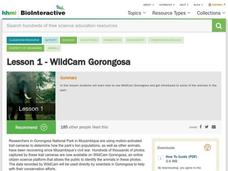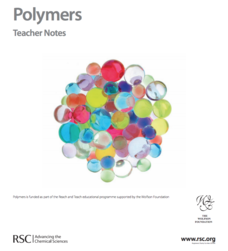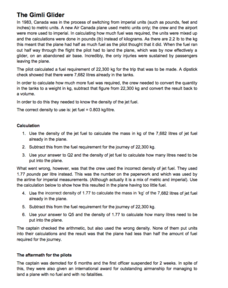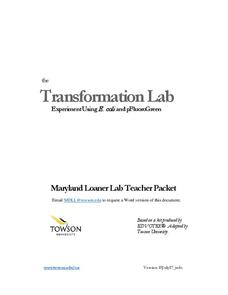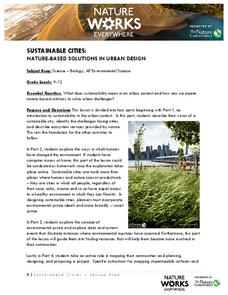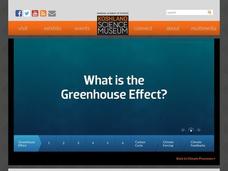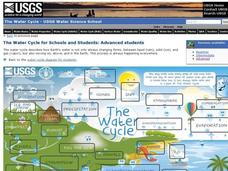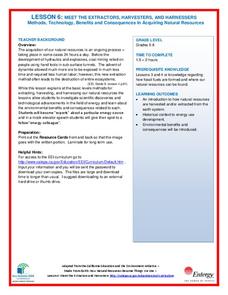Essential Energy
Being a Safety Star (Stage 3)
A spark of static electricity contains up to 3,000 volts, while a lightning strike contains around 3,000,000 volts. To understand electricity, its power, and the safety considerations relating to it learners engage in a comprehensive...
Serendip
Where Does a Plant's Mass Come From?
Where does the mass for a growing tree come from? Scholars consider a few different hypotheses and guess which is correct. They then analyze data from different experiments to understand which concepts science supports.
US Department of Energy
Go Far Cars Ramp: A Basic Ramp with Four Height Settings
Precise measurements make the job easier! One of the challenges when using an inclined plane for testing comes from pupils not using exact measurements. They often rely on books that slide or different ramp lengths when experimenting. By...
Howard Hughes Medical Institute
Sorting Finch Species
Don't just tell your class about Darwin's finches ... show them! Sort some of science's most famous birds using an interactive lesson. Learners try their hand at classifying finches using song, sonogram, and beak appearance, as well as...
Howard Hughes Medical Institute
Vertebrate Circulatorium
When you get to the heart of the matter, you learn a lot about an organism by studying its circulatory system! A perfect resource for a zoology or anatomy class, the simulation gives users a peek inside a variety of vertebrates to...
Howard Hughes Medical Institute
Alzheimer’s Disease: Piecing Together the Evidence
5.7 million Americans live with Alzheimer's disease. With limited funding for research, where should scientists focus? Young scientists learn about current research and create their own questions. They then decide the best areas to focus...
Howard Hughes Medical Institute
Lesson 2: Gorongosa National Park
How has Gorongosa National Park changed over time? Discover the park's rich history, dating back to primitive human times, through an interactive timeline and scientific reading. The second installment in an eight-part series explores...
Howard Hughes Medical Institute
Lesson 1: WildCam Gorongosa
Take a walk on the wild side! Episode one of an eight-part series of interactive lessons regarding Gorongosa National Park invites learners to become a part of the citizen science community. Scholars read a brief overview of the trail...
Colorado State University
Why Are Clouds White?
Is it possible to change the color of clouds? A three-part activity explores the scattering of light by the water droplets that make up clouds. After observing a demonstration, curious scholars conduct their own investigations of the...
Colorado State University
Why Are Compact Fluorescent Bulbs More Efficient?
Compact fluorescent bulbs are the easiest way to increase energy efficiency around the house. But why? Science scholars compare CF bulbs with their incandescent counterparts using a simple test. A solar-powered toy illuminates the...
Royal Society of Chemistry
A Solid-Solid Reaction between Lead Nitrate and Potassium Iodide
Why is it so difficult to make two solid compounds react? Investigate the concepts of particle collisions and rate of reaction using a quick demonstration. The colorful experiment features two plain, white solids combining to form a...
Royal Society of Chemistry
Polymers—Gifted and Talented Chemistry
Polymers are an important part of our day-to-day lives, but how much do your pupils know about them? Learn the basics and beyond in a series of activities designed to build skills in observation, planning, organic chemistry, and bonding.
Royal Society of Chemistry
The 400m Event—Chemistry and Sport
How do Olympic runners succeed in physically demanding events like the 400-meter dash? Physiology scholars explore the relationship between acids, bases, and the muscular system through a scenario-driven activity. The lesson focuses on...
Royal Society of Chemistry
Gimli Glider—Anecdotes for Chemistry Teachers
What's the moral of this story? Units save lives! Teach measurement conversion through storytelling in a quick math-based lesson. Young scientists learn how one country's decision to swap from imperial to metric standard units caused an...
Royal Society of Chemistry
A Microscale Acid-Base Titration
Watch as acids and bases put smiles on their faces. Young chemists learn the concept of acid-base titration firsthand in a microscale experiment. Working groups collaborate, titrate, then use their data to determine the concentration of...
Towson University
Transformation Lab
Transform your class' understanding of genes and antibiotic resistance with the Transformation Lab. Junior geneticists create and observe their own resistant strains of E. coli through research, discussion, and experimentation. The...
Polar Trec
Why Can’t I Eat This Fish?
Can turning on the television lead to toxins in the food supply? The lesson offers an opportunity for young scientists to complete guided research. A worksheet lists each question as well as the web page necessary to answer the question....
Polar Trec
Science in Antarctica
PolarTREC brings polar researchers and educators together to benefit both science and education. Pupils select one research project in Antarctica to explore and present to their peers. Scholars polish research and presentation skills as...
Polar Trec
Touring the Poles
Would you want to vacation in the Arctic or Antarctic regions? Scholars research both regions and produce a travel brochure trying to convince tourists to visit. The project focuses on the geography, climate, flora, fauna, and indigenous...
Nature Works Everywhere
Sustainable Cities
Investigate aspects of sustainable cities and relate them to where you live! A detailed activity first investigates the definition of sustainability. Learners then explore human impact on the environment and social justice. Their final...
National Academy of Sciences
What is the Greenhouse Effect?
The greenhouse effect warms up earth enough so it can support life, but if it heats up too much, life won't be able to survive. An interactive presentation covers the greenhouse effect, the carbon cycle, climate forcing, and climate...
NOAA
Fishy Deep-sea Designs!
Oceans represent more than 80 percent of all habitats, yet we know less about them than most other habitats on the planet. The instructor introduces the epipelagic, mesopelagic, bathypelagic, twilight, and midnight zones in the ocean....
US Geological Survey
The Water Cycle for Schools: Advanced Ages
Explore the water cycle in an interactive diagram of the process. The diagram shows how water is a moving system and constantly changing forms. The resourc includes vocabulary words that pupils click on in order to discover more about...
National Wildlife Federation
Meet the Extractors, Harvesters, and Harnessers: Methods, Technology, Benefits and Consequences in Acquiring Natural Resources
There are advantages and disadvantages to all sources of energy; the trick is determining which one has the least impact! Part six in the series of 12 has learners further explore energy resources. After reading information about one of...









